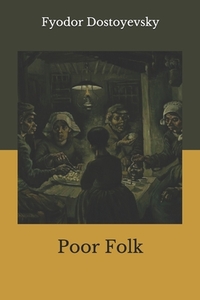Take a photo of a barcode or cover
Empezando por la premisa de que tengo a la literatura rusa en general, y a Dostoievski en particular, en una elevadísima estima, siempre siento cierta aprensión con sus lecturas por la complejidad extra que me suponen, porque, no nos engañemos, la literatura rusa es compleja desde las infinitas variaciones de nombres de los personajes hasta el más profundo y oculto detalle de la narración.
La primera obra de Dostoievski, escrita con solo veinticinco años, es cruda, agridulce y una montaña rusa de altos y bajos en la vida de dos personajes que tejen toda la trama a través del intercambio de cartas. Las novelas epistolares siempre me hacen sentir en cierto modo una intrusa, como si me adentrara en archivos íntimos que no me pertenecen. Cosa que, vista desde otro ángulo, también me resulta de un interés abrumador, y me hace disfrutarlas de una manera distinta.
Dostoievski hilvana la narración gracias a únicamente dos personajes principales que, a su vez, presentan retratos de otros muchos personajes y sus penurias de una manera que es, sencillamente, brillante. De una sencillez absoluta pero complejísima y de un estilo todavía falto de ser pulido, los personajes hablan y actúan de un modo sopesado pero apasionado, obsesivo en el caso de Devushkin muchas veces. El monólogo interior de los personajes, que es intenso, caótico, delirante y febril, es aquí solo una breve muestra de lo que luego se convertirá en una de sus más representativas características literarias (característica que estoy deseando leer en posteriores obras que todavía tengo pendientes).
Respecto a Dévushkin, la síntesis que de él hace Dostoievski entre el protagonista de El capote de Gogol y del de Los relatos de Belkin de Pushkin (Akákievich Bashmachkin y Simeón Virín respectivamente), dejando pistas de ello a lo largo del relato -Dévushkin lee ambas obras a lo largo del intercambio de cartas con Várenka, siendo ella quien se las presta-, es una de las cosas más destacables y magistrales de la novela, además de que son pequeños detalles de las obras que a mí, personalmente, me encantan.
Mi conclusión, básicamente, es que solo me quedan cinco años para alcanzar esta genialidad en mi opera prima, si es que algún día yo escribo una entera. Qué sublimes eran -y son- las letras de este señor y cuántas enseñanzas me quedan por aprender de él.
La primera obra de Dostoievski, escrita con solo veinticinco años, es cruda, agridulce y una montaña rusa de altos y bajos en la vida de dos personajes que tejen toda la trama a través del intercambio de cartas. Las novelas epistolares siempre me hacen sentir en cierto modo una intrusa, como si me adentrara en archivos íntimos que no me pertenecen. Cosa que, vista desde otro ángulo, también me resulta de un interés abrumador, y me hace disfrutarlas de una manera distinta.
Dostoievski hilvana la narración gracias a únicamente dos personajes principales que, a su vez, presentan retratos de otros muchos personajes y sus penurias de una manera que es, sencillamente, brillante. De una sencillez absoluta pero complejísima y de un estilo todavía falto de ser pulido, los personajes hablan y actúan de un modo sopesado pero apasionado, obsesivo en el caso de Devushkin muchas veces. El monólogo interior de los personajes, que es intenso, caótico, delirante y febril, es aquí solo una breve muestra de lo que luego se convertirá en una de sus más representativas características literarias (característica que estoy deseando leer en posteriores obras que todavía tengo pendientes).
Respecto a Dévushkin, la síntesis que de él hace Dostoievski entre el protagonista de El capote de Gogol y del de Los relatos de Belkin de Pushkin (Akákievich Bashmachkin y Simeón Virín respectivamente), dejando pistas de ello a lo largo del relato -Dévushkin lee ambas obras a lo largo del intercambio de cartas con Várenka, siendo ella quien se las presta-, es una de las cosas más destacables y magistrales de la novela, además de que son pequeños detalles de las obras que a mí, personalmente, me encantan.
Mi conclusión, básicamente, es que solo me quedan cinco años para alcanzar esta genialidad en mi opera prima, si es que algún día yo escribo una entera. Qué sublimes eran -y son- las letras de este señor y cuántas enseñanzas me quedan por aprender de él.
dark
emotional
funny
hopeful
informative
inspiring
reflective
sad
tense
medium-paced
Plot or Character Driven:
Character
Strong character development:
Complicated
Loveable characters:
Yes
Diverse cast of characters:
Yes
Flaws of characters a main focus:
Yes
Questo è un romanzo minore del grande autore e suo esordio, ma nonostante ciò è assolutamente da riscoprire e da leggere, perché raramente mi sono trovata così coinvolta in una storia d'amore. Varvara Dobroselova e Makar Alekseevič Devuškin sono cugini di secondo grado, abitano sulla stessa strada e si amano di un amore tenero e commovente, come le lettere che si scambiano in cui il racconto della rispettiva povertà non riesce mai a scalfire il sentimento che traspare dalle loro parole. Bellissimo.
P.S. ho ascoltato l'audiolibro, letto da Paola De Crescenzo e Danilo Nigrelli, davvero stupendo
P.S. ho ascoltato l'audiolibro, letto da Paola De Crescenzo e Danilo Nigrelli, davvero stupendo
التجربة الثانية لدوستويفسكي لطيفة خفيفة تحمل معاني كثيرة و لكن في نصفها الثاني بدأت تتكرر الرسائل بعض الشيء .
في البدء توقعت بأنهما حبيبين و لكن في الجزء الأخير اكتشفت بأنه العكس ، لكن بعيداً عن القصة الأساسية نفسها أثرت فيني للغاية قصة الأبن جار الفتاة في صِغَرِها و أبيه
في البدء توقعت بأنهما حبيبين و لكن في الجزء الأخير اكتشفت بأنه العكس ، لكن بعيداً عن القصة الأساسية نفسها أثرت فيني للغاية قصة الأبن جار الفتاة في صِغَرِها و أبيه
dark
emotional
reflective
medium-paced
Plot or Character Driven:
Character
Strong character development:
Complicated
Loveable characters:
Complicated
Diverse cast of characters:
No
Flaws of characters a main focus:
Yes
Poor Folk reads like a prototype. In some ways it reminded me a great deal of the Double, and I even found this story more enjoyable than the other one (sorry, the Double is just, not that great). The character of Makar Alexeevich is very similar to that of Mr. Golyadkin in the way he interacts with the people around him. Especially at his lowest. There are also parts of the story that evoke the sense of Dostoevsky's later work.
Even in the beginning of his career as a writer, Dostoevsky knew how to write very subtle characters. Trying to make villains or heroes out of either Makar Alexeevich or Varvara Aleexevna is pointless. They both are selfish in their own ways, and though they love each other they really do not seem to understand one another. By the end, I wasn't sure who I felt worse for.I do think the way their dynamic changes as Varvara is permanently lifted out of poverty, but Makar stays in a more tenuous place, is quite interesting. There's a distinct shift in their dynamic, in a way that's difficult to describe.
Describing most of my thoughts about this story is difficult to describe, I have the sense that some of it has alluded me. It's not perfect - Dostoevsky tries to pull in too many disparate threads without any real setup. If it were longer, it would have perhaps worked better. As it is, the plot is a little contrived in places. Especially when it comes to Varvara. But Dostoevsky was always better at characters than plots, in my opinion. In the end I liked it immensely. Ah Dostoevsky, I cannot quit you.
Even in the beginning of his career as a writer, Dostoevsky knew how to write very subtle characters. Trying to make villains or heroes out of either Makar Alexeevich or Varvara Aleexevna is pointless. They both are selfish in their own ways, and though they love each other they really do not seem to understand one another. By the end, I wasn't sure who I felt worse for.
Describing most of my thoughts about this story is difficult to describe, I have the sense that some of it has alluded me. It's not perfect - Dostoevsky tries to pull in too many disparate threads without any real setup. If it were longer, it would have perhaps worked better. As it is, the plot is a little contrived in places. Especially when it comes to Varvara. But Dostoevsky was always better at characters than plots, in my opinion. In the end I liked it immensely. Ah Dostoevsky, I cannot quit you.
Graphic: Alcoholism
dark
sad
Poor People is Dostoevsky's first novel. As a epistolatory work, the reader is limited to knowing only what the two letter-writers reveal in their writings. A knowledge of Gogol's "The Overcoat" and Pushkin's "The Stationmaster" will increase one's ability to appreciate the irony inherent in the book.
Written in an epistolary form, the story describes the sad and hopeless love between the civil servant Makar Devushkin and the young seamstress Varvara Dobroselova.
Fyodor Dostoyevsky builds a unique psychological depth in his characters, and through the tragedy of their everyday life he portrays social and moral problems with which we still live today.
Fyodor Dostoyevsky builds a unique psychological depth in his characters, and through the tragedy of their everyday life he portrays social and moral problems with which we still live today.
Çoğunluğun sınıfı olan 'alt sınıfı', tüm gerçekliğiyle ve olağanca sergileyen önemli bir klasiktir.Bu sınıfın kaygılarını, sevinçlerini, haykırışlarını, afacanlıklarını ve hınzırlıklarını bir kar topu yapıp suratlarımıza fırlatır. Böylelikle biraz acıtır.Okur kitabı okudukça, karakterlere bakıp şunu diyebilir; ''bu ben değilim.'' fakat ''bu şahsiyetler bize hiçte uzak değillermiş.'' diyeceklerdir.

Illumination in Saint Petersburg by Fyodor Vasilyev (1869)
A short novel focused on a powerful exchange of letters between two bright and introspective individuals living in difficult circumstances in 19th century Saint Petersburg. At first I had to get used to the epistolary style (the diary excerpt in the beginning of the novel was a temporary relief as I was struggling a bit), but the style of the letters and their heartfelt content quickly grew on me. I realize that a novel like this one probably should be read in one sitting as it allows one to truly immerse oneself in the unfolding of the drama. Poverty (not a surprise) blends with the life of a man and a woman that are emotionally connected to each other. Dostoyevsky's first novel managed to make an impression on me as I approached the last third of the book. Suddenly the letter exchange somehow dissolved in my mind and I only noticed the power of the feelings and thoughts these two bright individuals brought forward in their writing. I presume that this novel was an early example of realism with a focus on the poverty existing in Saint Petersburg at the time. An excellent novel.





